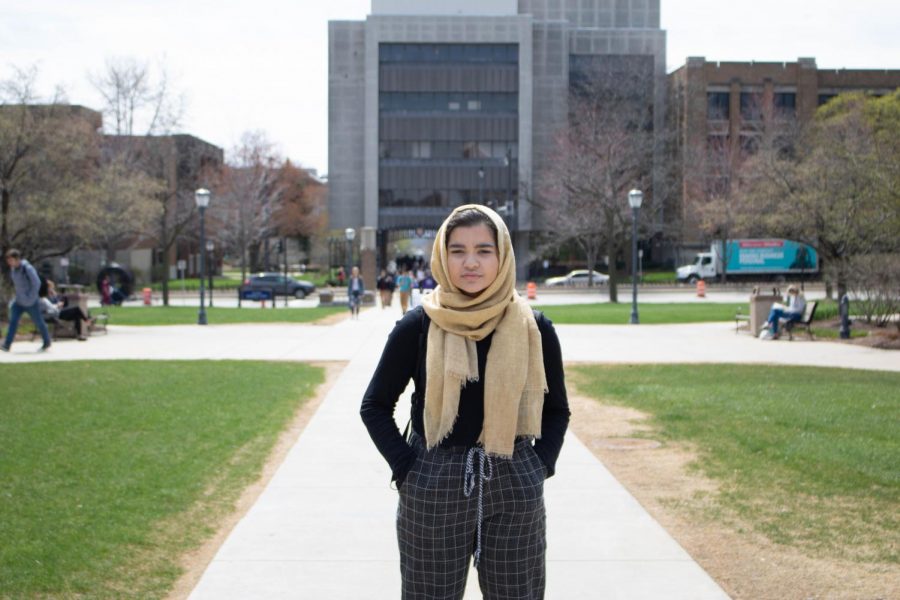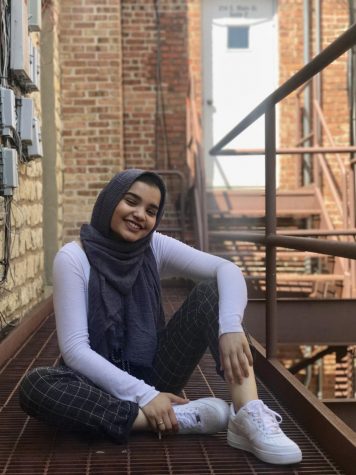https://soundcloud.com/marquette-radio/work-to-be-done
My biggest fear entering college was not the difficulty level of the courses, the strict deadlines from professors or even the hardships of making friends. My biggest fear was stepping into my freshman dorm room and seeing a Make America Great Again flag plastered on the wall across from my bed.
Although this fortunately did not happen, I had a sincere and severe concern of this actually happening. Some people may believe this was an irrational fear. However, I knew it would be difficult transitioning from a high school with a 46 percent white population to a university with a 68 percent white student majority and 78 percent white faculty population.
Instead of a roommate who had Trump merchandise in the dorm, I moved into a hall where the entire west fifth floor community in Cobeen Hall was white. Not only am I a girl of Pakistani heritage, I am a Muslim. The physical manifestation of my Muslim identity is displayed by the scarf I wear on my head. I was clearly the anomaly in the group and knew I would have to make the extra effort to integrate myself into my dorm community. Since I am somewhat of an introvert, this could possibly be an excuse I am making for myself. At the same time, I was in no way motivated to do the work to include myself in dorm activities or events. I knew that the end result of being friends with these white girls is that I would always question the real connection between us. I contemplated on why I would even try in the first place then. I feel like I would not be able to relate to them on aspects of our lifestyle or values because our existence is so different. I feel like I would be faking my identity to fit into white culture.
The same question of a legitimate connection is carried over in my relationships with my professors. At the beginning of every course, I take the first couple of classes to observe whether the instructor seems to hold ignorant beliefs. Red flags include disrespectful or degrading tones and rhetoric when discussing issues that affect minorities or anything that strays away from a typical white majority ideal. If the professors do not want to discuss politics, it usually means they are privileged enough to not have politics affect their life. Depending on the assumption I make, it affects how comfortable I feel asking questions or contributing to the discussion in class.
As I walk into class, I automatically understand that I will be the only hijabi without even having to look around. I have accepted this fact and become numb to it now. The first class I attended at Marquette was COMM 1000. It was a class of around 70 students, and none of them looked like I did. There might have been a few African American students, but not a single Asian or Muslim student was present. I try not to let it affect my behavior too much. At the same time, the least I try to do is find another minority that I can automatically connect or relate to in order to feel comfortable in the classroom. In a lot of my classes at Marquette, I have never found that one other minority student. Especially as a communications major, minorities seem to be few and far between, so I have to accept the reality of the situation and sit in a classroom as the only one with brown skin. It makes me, a female Pakistani Muslim American, feel automatically excluded from the white majority.
I also understand that by identifying both as an Asian American and a Muslim, I am forced to become the representative for my communities, whether I want to be or not. I have to speak out when my religion is being attacked because who else is going to? Who else is going to change the ignorant beliefs of those who have misinformed perceptions? I do not always have the scholarly responses or the effort to fix these wrongs, but in a white majority classroom, I feel forced to do so. My white counterparts constantly expect me to give them answers. At times, it feels like they are asking these questions to make themselves feel better and more educated even though there is so much more involved with appreciating a minority community than a few answers to some questions. That is why resources like scholars and social media exist; I should not have to take the burden in place of them.
As a minority student, these are the processes I experience in my head on a daily basis walking around and attending the very majority white campus that Marquette University entails. White, cisgender, heterosexual, male Christian students do not have the same pressures and societal responsibilities placed on them. They do not have to ask the questions I constantly ask myself. Questions like if they must change their behavior to fit a certain white majority mold. Questions such as “am I correctly representing my race?,” “am I including my people in discussions without trying to always take the attention?,” or “are there people in my classes that look like me?” When I try to relate the class discussion to my own experiences as a Muslim Asian American, I am fearful that my peers become annoyed with me trying to focus the conversation on myself. Even the small act of changing my name when ordering food, so the Einstein Bagel workers do not spend the extra minute trying to figure it out in front of everyone else. White people do not need to use additional energy to ensure they are included in the conversation because they are the ones automatically prioritized from the beginning.
I’ve come to the conclusion Marquette University holds
racist values.
There is an environment consistently created by the staff, students and the institution where the white majority presence it always felt and held over non-white individuals’ heads. I fully understand this is my and other minorities’ opinion that I have talked to at Marquette. I personally feel that the university continues to make decisions or perpetuate behaviors that do not fully accommodate the needs of its non-white students. This carries out through actions such as devaluing minority organizations’ events, failing to publicize the safe spaces on campus for minorities and ignoring the need to truly create
those spaces.
I understand the faculty and administrators might have the best intentions to incorporate minority students in their efforts, but intention varies a lot from the execution, impact and truth of their behavior. These problems cannot continue to be ignored and handled with little to no help from the university. Rather, there needs to be authentic intentions behind actions and understand the effects, more the absence of any effects, that the individuals in a higher position’s rhetoric, imagery and actions all have on non-white students on campus.
I would like to see real, sincere passion and care from the administrators in reaction to events that have affected minority communities. I do not want to see the same script written in every email for every time a minority is under attack. I want the tour guides to emphasize and focus on the safe spaces on campus, so that minorities looking into Marquette know they have the power to increase their influence and space at this university. I want clubs and organizations focused on the minority experience to be given the same amount of attention and resources as other organizations with a white majority. I want professors to be held accountable for their hurtful words and actions and I want minorities to feel comfortable enough to report these kinds of behaviors. I would like to see hurtful imagery toward minority communities be eliminated from Marquette’s buildings and brands. For example, the way in which Native Americans are depicted in the Marquette crest are offensive to the group, but it continues to be used around the university. I want Marquette’s services to include the values and needs of minority students. I fought with Sodexo, Marquette’s food caterer, for months to try to include Muslim-friendly options since I am paying $4,000 a year to eat on campus. In the end, I gave up and accepted that this institution simply will not accommodate. I understand that this might be a long-winded list that includes solutions from various aspects of the university, but this is how much work I believe still must be done.
This has been my experience of Marquette University in my last two years attending here. All individuals have the right to feel how they do and interpret situations in their own ways. I know that this is just my story and that other minorities may feel completely differently than me.
This is an opinions narrative piece written by a columnist.




Loi • Jul 30, 2019 at 11:55 am
You want people to appease you while you shop intolerance every step of the way ? Look in the mirror and examine your own actions and prejudices. Looking over you past articles, it seems to be all social justice / victimhood garbage. Hoping you’ll grow up soon.
Shasta • Jul 29, 2019 at 8:02 pm
Imagine the poor kids who feel oppressed by your religion while you flaunt it at school. There are Asian refugees that escaped islam and to see you boldly wear a symbol of hate hurts them.
Jon Winter • Jun 11, 2019 at 9:44 am
I’m sorry, but why is it Marquette’s responsibility to accommodate to you? They are a private business and can run their business as they please. “If the professors don’t want to discuss politics, it usually means that they are privileged enough to not have politics affect their life.” Or just maybe, and this is a strong maybe, they are to scared to voice any conservative viewpoints due to academic institutions such as Marquette firing employees over freedom of speech (John McAdams). The fact that you think Marquette holds racist values is honestly sad. You stated that the white majority presence is always felt. Again this is another maybe, but maybe it is because a majority of the students are white?? This would be like going to an HBCU and getting upset that the school isn’t accommodating to the white perspective. It seems like from reading this article that you are in for a big wake up call after graduation. It isn’t this schools responsibility to offer everyone a “safe space” just because their feelings are hurt, and it sure isn’t going to be like this when you step out into the real world after graduation.
Michael Casey • Jun 10, 2019 at 10:38 am
“If your only tool is a hammer, eventually everything starts looking like a nail.”
By her own admission, the writer came to MU looking for prejudice and, with a bit of effort, found it. Contrast this essay to that of Dr Arthur Bowman in last month’s MU Magazine. Bowman came to MU in, wait for it, 1963 from Alabama, so I think he knew a bit about oppression and prejudice. His experience as one of 13 brown kids in the whole school?
“It took some getting used to, because I had never really socialized with white people. And here I was, thrown in this environment where there were only 13 black students on Marquette’s campus….It was an easy adjustment because everybody was so nice,” he says. “They were just different. They were good people.”